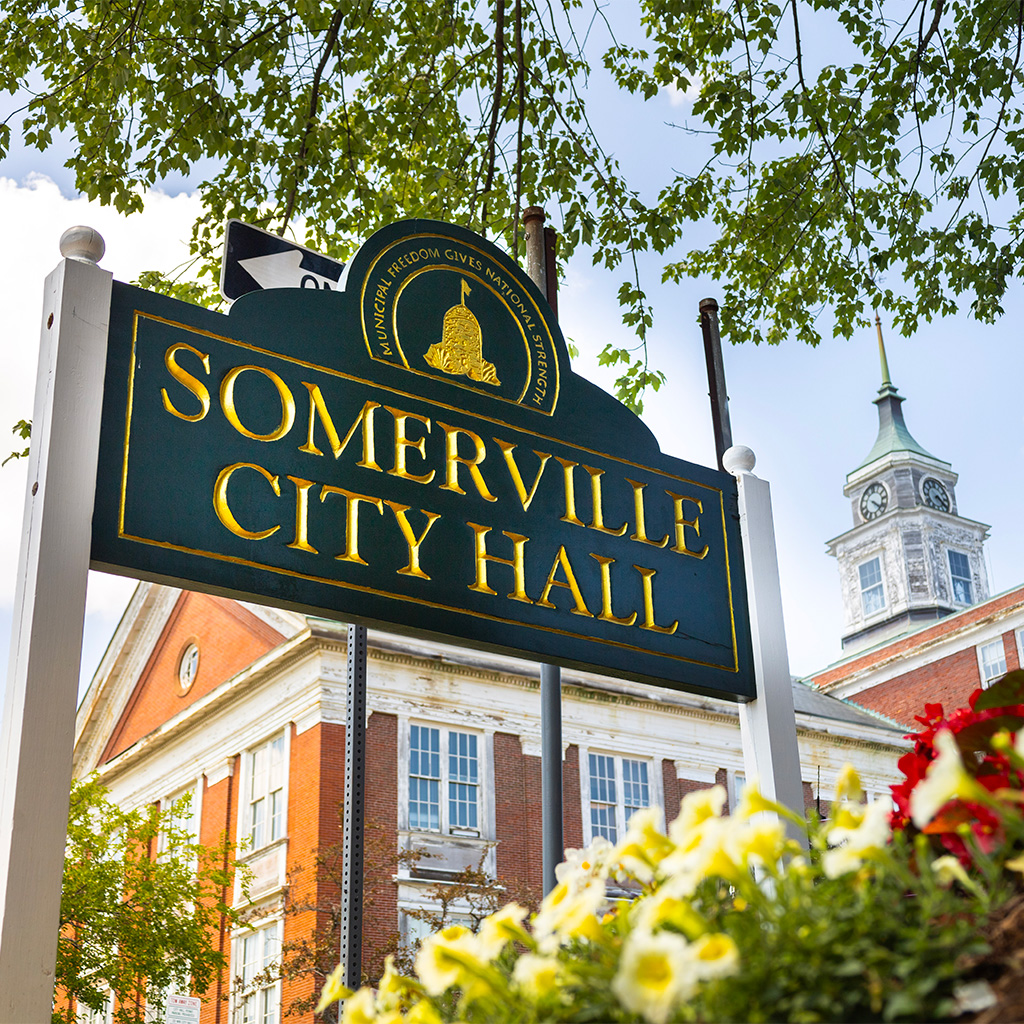Somerville campaign season is without debate, leaving candidates to knock and ponder a cause

There are 18 candidates for the mayor’s office or a City Council seat this year in Somerville. (Photo: Kate Wheatley)
Somerville’s election season has come knocking, literally.
Unlike in years past, this campaign season has no set dates for political forums or debates. Even the providing of candidate profiles as a voter resource is stalled this year, as the Somerville Media Center relocates after being told it must leave its longtime home in Union Square.
Thus candidates are knocking on doors – or planning to – to draw out voters for contested races.
“As opposed to two years ago, this year looks like it’s really going to be about the fall. I’m ready to get out there and keep talking to voters like I have been for two years,” said Jake Wilson, councilor-at-large.
In 2021, the city had a preliminary election for four mayoral candidates and a handful of City Council candidates for open seats in wards 5 and 7. Of approximately 60,000 registered voters in Somerville, roughly 18,000 voted in the municipal election that followed.
Without a preliminary, this year’s election season – which was locked into place in early June – is off to a quieter start. There may be many reasons.
“There’s a lot of burnout, especially after a contentious 2021 election. A lot of folks are dealing with uncertainty in job security and the lingering effects of Covid, and it’s difficult to gain traction as an activist,” Somerville resident and activist Chris Dwan said. “We had Billy Tauro stirring things up, DSA really canvassing the heck out of their slate. And I think a lot of people are tired of it. There’s no realistic competition for the mayor. For the at-large seats, there are five running for four. For the rest of the council, my impression is that it’s going to come down to who knocks on the most doors and actually gets folks out to vote. That is substantially less interesting from a punditry platform.”
Incumbents and their advantage
City Council president Ben Ewen-Campen had some ideas too about the dampening of discourse from two years earlier: “There were a ton of open seats in 2021,” Ewen-Campen said. “As for the decision to run for mayor, that’s a serious one. It doesn’t really surprise me that people are not throwing their hat in the ring for it.”
The council has 11 members who serve, like other elected officials, two-year terms. The Ward 5 council seat is contested between two newcomers, while incumbents in Wards 1, 3 and 6 also face challenges to be decided Nov. 7.
Wilson explained the immense advantage incumbents have in their knowledge of municipal government and its systems. “It’s a lot for a challenger to learn in those few months,” Wilson said.
There are 18 candidates for the mayor’s office or a City Council seat this year in Somerville, and 11 are incumbents. On the School Committee side, there are seven seats, all unopposed; six will be filled by incumbents.
Faded potential for clashes
Still, Tauro, a Trump-supporting business owner and publisher of the Somerville/Medford News Weekly, is running again in hopes of unseating Mayor Katjana Ballantyne. And some expected this to be a year of tension over whether the Democratic Socialists of America were going to lock in an unblockable progressive majority.
So it’s not quite clear why this year’s election is quieter than last, though Tauro got only 15 percent of voter support in the primary and 6.5 percent in the general election, running as a write-in candidate.
By comparison, neighboring Cambridge has a nine-seat, fully at-large city council with 24 candidates running – only six of whom are incumbents – for a field slightly larger than two years ago. There are eight forums and meet-and-greets scheduled so far from Sunday through Oct. 24.
President of the Somerville Chamber of Commerce Stephen Mackey believes interest in municipal elections in his city has simply fallen off. “Some folks think everything’s taken care of, or they say they don’t have time for it. But Somerville has over 80,000 adults and children, and we have less than 10,000 of them calling the shots,” Mackey said.
No place for common dialogue
Mackey also blamed political polarization. “People go to their corners now; there’s not a common dialogue. There’s not the media we all know, that used to kind of structure a conversation. Now there’s all the more media, social media, but it’s enabling people to continue with their own preconceived thoughts,” he said.
Dwan, a longtime reporter on council meetings over social media, agreed with Mackey. “There’s a certain degree of politics in which you can’t afford much common ground, but a strong local voice provides a central narrative not only for what is, but for what we’re talking about now … or that was the old way, anyway,” Dawn said. “I don’t want to romanticize the past.”
Mackey plans to invite the mayoral candidates and at-large council candidates for virtual conversations with the Chamber of Commerce as early as next week. The Somerville Media Center estimated it will have candidate profiles available by the end of the week. Candidate Wilson said other organizations have sent out questionnaires.
In the meantime, candidates are relying on voters answering the door when they knock – even if it’s the old way. Dwan is sympathetic.
“I think there’s something about engaging in local civics, not even politics, that has the potential to save society,” Dwan said. “The City Council may be weak in terms of hard power, but it provides a public agenda and a space in which we can force public conversations via petition. Lacking a central newslike organ and lacking a shared platform, that is one place where we could have a central conversation in the city.”




